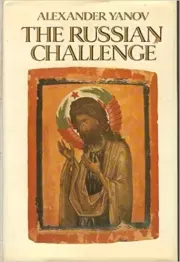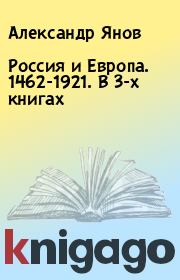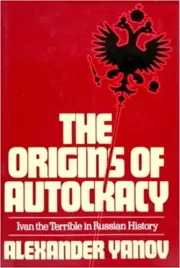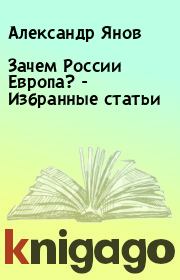Александр Янов - The Russian challenge and the year 2000
 | Название: | The Russian challenge and the year 2000 |
Автор: | Александр Янов | |
Жанр: | Старинная литература | |
Изадано в серии: | неизвестно | |
Издательство: | неизвестно | |
Год издания: | 1985 | |
ISBN: | неизвестно | |
Отзывы: | Комментировать | |
Рейтинг: | ||
Поделись книгой с друзьями! Помощь сайту: донат на оплату сервера | ||
Краткое содержание книги "The Russian challenge and the year 2000"
Argues that the West must support the Soviet Union's emergence from political and cultural isolation in order to prevent the rise to power of Russian fascism
Читаем онлайн "The Russian challenge and the year 2000". [Страница - 3]
- 1
- 2
- 3
- 4
- 5
- . . .
- последняя (99) »
This was very similar to the position I found myself in after the publication of my Russian New Right in 1978. The only difference was that I had written not about Bolsheviks, whose role has become somewhat clearer over the past seven decades, but about Russian nationalists, whose role as yet remains just as dark as that of the Bolsheviks in 1903. In just the same way, those crtics who wished me well and were full of revuls ,»n for Russian chauvinism failed to take this new ideological phenomenon se ously as a real political alternative to the existing regime. At the same time, the nat'.onalist Western 'fellow-travellers' attacked me- for slandering Russian patriotism, because there are good nat.-onal.'sts too — selfless fighters against accursed Communism (wf ch suppresses human rights and hinders Jewish emigration out of the Soviet Union) and are thus our natural allies.
It is for these reasons that I have wr ten another book about Russian nationalism, in which all the i's will be dotted, and all the t's crossed, and which, hopefully, will not be so open to misinterpretation. In the final analysis, Russian national >m did not come into the world yesterday or in the 1960s. It has a long history, rich in events. It arose at approximately the same time as Marxism, a century and a half ago. It underwent its own complex ana dramatic evolution, it had ts ups and downs and its metamorphoses, which contemporary nationalists are now repeating just as unsuspectingly as tneir contemporary Western readers. Its political doctrine was worked out long before the 1917 resolution. Its response to that revolut on was fas^ sm. Its political potential has been clearly and unambiguously demonstrated. Its resurrection in the Soviet Union in the 1960s was predictable, n the same way as its emergence in the 1830s. It answered deep needs within the Russian political system in the first half of the nmeteenth century, just as it answers them today in the second half of the twent leth.
The entire historical drama of the ideology of Russian nat:onalism, or the Russian Idea, as Nikolai Berdiaev so aphoristically named it in the twentieth century, was omitted in The Russian New Right. That book was devoted exclusively to one short episode in the h .story of the Russian Idea — the ideological explosion of the 1960s. To that extent, it is my fault that the resurrection of the Russian Idea was received as an isolated and exotic episode in the history of Sov et с ssent. Only in the broad historical perspective can it be understood that this explosion, though put down by police repression in the mid-1970s, was not, and could not have been, crushed completely. In just the same way, the Bolsheviks were put down but were never completely crushed by the repressions accompany ing ihe dramatic explosion of 1905 — 07. The year 1917 was still in store for them, just as the year 2000 may still be in store for the champions of the Russian Idea. At least they hope so, as the reader of this book will discover.
The present book is constructed ,n an entirely different way from The Russian New Right, though it does nclude several chapters updated and revised from the earlier work. Here. I describe events that took place at the end of the 1970s and beginning of the 1980s after the publication of The Russian New Right. Hut more importantly, I also try to capture the historical drama of the Russian Idea, from the point of its very conception up to ts crushing defeat in the period 1917 — 21. In presenting the subject thus, I want to make it clear that m the Russian Idea we have a phenomenon of first-order political significance which could enjoy a new and tr umphant resurrection at the end of this century, if Gorbachev's 1980s reforms come to naught (in just the same way as Bolshevism enjoyed a resurrection after the collapse of Stolypin's reforms at the beginning of this century).
Above all, this book is intended to help Western readers gain an understand'ag of the fancilul intricacies of the Russian Idea, of the complexities of is political doctrine, and peripeteia of its historical drama. It should then be less easy to confuse it with the patriotic emotions or ideological symbols that Soviet propaganda seeks to exploit. I therefore hope that reviewers will not mistake the book for e;iher an assault on Russian chauvirusm or an attack on Russian patriotism. I, no less than they, deplore chauvinism in any form and respect each and every patriotism. But that is not my object here. My book is about the future of Russia — and quite possibly the world — should the Russian Idea be fated someday to triumph. This is the Russian challenge I am concerned with. We may not have seen the worst of it yet.
In conclusion I want to thank all my friends and readers who supported me throughout the fierce campaign waged against me by almost the entire emigre press after the publication of The Russian New Riqhi, and which, alas, the Russian Idea's Western fellow- travellers joined. I also want to thank the magazines Sintaksis and 22 for not having joined this campaign Finally, I am deeply indebted to the Harry Frank Guggenheim Foundation for making it possible for me to research the misadventures of the Russian Idea at the beginning of the twentieth century.
т
Introduction: Russia vs. Russia
My book The Russian New Right made its appearance during one of the most dramat:c periods n modern history, when the era of detente between the superpowers was already over, but humanity d'd not yet know what kind of new era it was entering. Would there be a revival of the Cold War, or perhaps an open confrontation between the superpowers, or even another world war? Eugene Rostow summed up the mood of those years exactly when he said, 'We are living in a pre- not a post-war world.'1 The very air was saturated with apocalyptic premonitions. Everyth lg, it seemed, heralded a new world crisis. The deployment of SS-20 rockets on the European territory of the USSR was 'nterpreted as preparation for the 'Finlandization' of Western Europe. Soviet exploits in Africa seemed to be aimed at a total breach of commui cations between the US and its allies. The invasion of Afghan stan looked like the first step toward an assault on the oilfields of the Middle East.
In short, it would be difficult to imagine a less appropriate time tor the appearance of a book on the revival of Russian imperial na> onalisin.2 What sei ous person could be expected to take an interest in the sudden rebirth of a distant alternative to Soviet Marxism in Moscow when fear of an impending
--">- 1
- 2
- 3
- 4
- 5
- . . .
- последняя (99) »
Книги схожие с «The Russian challenge and the year 2000» по жанру, серии, автору или названию:
| David Remnick - A Year of Putin’s Wartime Lies Жанр: Старинная литература Год издания: 101 |
Другие книги автора «Александр Янов»:
 |
| Александр Янов - Россия и Европа. 1462-1921. В 3-х книгах Жанр: Публицистика Год издания: 2008 |
 |
| Александр Янов - The Origins of Autocracy Жанр: Старинная литература Год издания: 1981 |
 |
| Александр Янов - The Russian challenge and the year 2000 Жанр: Старинная литература Год издания: 1985 |






